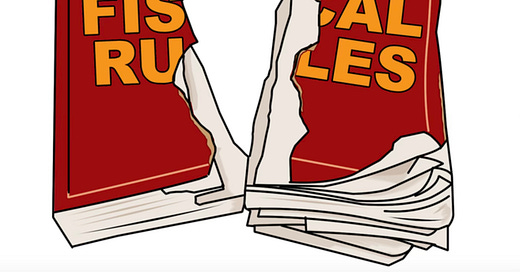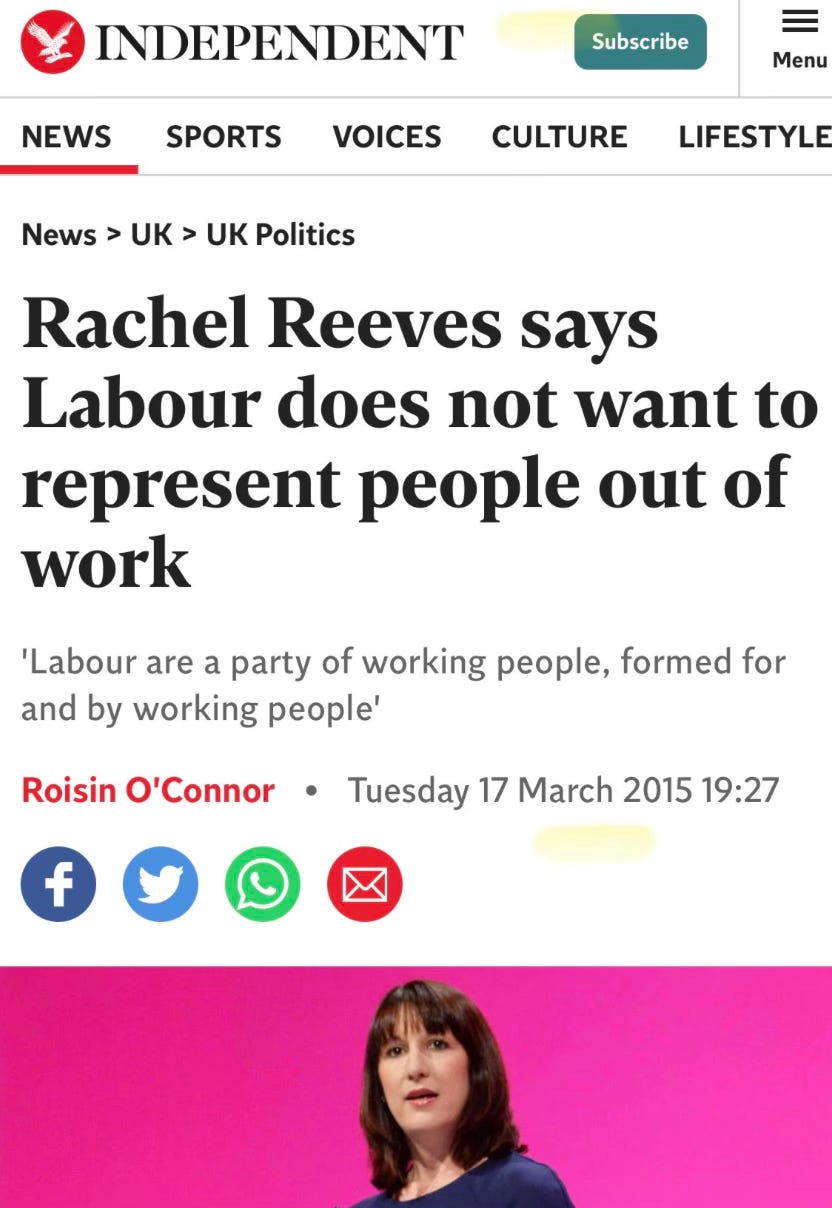Published in The National, March 9th, the Edinburgh Evening News, March 10th, and The Herald, March 11th, 2025.
It’s widely expected that in her spring budget, Rachel from Accounts Reeves will cut welfare spending so she doesn’t have to break her “ironclad” fiscal rules. We can’t have her losing face, can we? Far better to punish the poor than embarrass the Chancellor.
So what exactly are ‘fiscal rules?’ They are fiscal policy restrictions the government concocts to constrain its decisions on spending, such as requiring that the 'deficit’ stay below a certain arbitrary level. It’s like donning a strait jacket so even if more spending is needed and people are begging for it, Reeves can say, “sorry, our fiscal rules mean we can’t possibly help you. In fact, we are going to have to hurt you.”
We’re told that fiscal rules are necessary because otherwise, spending would get out of control and pile up debt for future generations to deal with. This is silly. Government is not like a household - it doesn’t need to balance its budget. If it did, there would be no ability to save and no money for public or private investment. What people don’t understand, including Reeves, is that government debt is the money supply.
In fact England, which later called itself the UK, has run a national debt since 1694, the year the Bank of England was created. [In 1694 Scotland was still a sovereign nation. A year later, the Bank of Scotland was established by an act of the Scottish Parliament and in 1696 it became the first bank in Europe to issue a paper currency.]
Fiscal rules were first introduced by the inept Gordon Brown in 1997 and remained unchanged for a decade.
But since the 2008 financial crisis, the rules have changed more frequently, and are broken just as frequently. The current fiscal rules, set in October 2024, are the tenth the UK has had.
Reeves has three main rules:
Rule 1. The current budget should be on course to be in balance or surplus by 2029/30 (‘stability rule’). This means that costs must be met by tax revenues, not by money creation.
Why this is stupid. The only way to revive a moribund economy that’s far from full employment and whose public services are crying out for investment is for government to spend money into the economy, but Reeves’ Rule 1 means she can’t or won’t. John Maynard Keynes understood what Rachel from accounts clearly doesn’t - the way to reverse an economic downturn and stimulate productive economic growth is to ramp up public spending, not constrain it.
Rule 2. Net financial debt should fall as a share of the economy in 2029/30 (‘investment rule’). This is commonly called the Debt/GDP ratio.
Why this is stupid. That national debt isn’t a threat - it represents the savings of pension fund, banks and foreign governments. It’s the money created by the government that hasn’t been taxed back. In essence, it’s the money supply, and it never needs to be repaid.
The only thing Reeves should care about is whether the government is spending enough to achieve economic growth and full employment. Nothing else should matter. It’s the government’s job to manage the economy to deliver the goals of society, not indulge in a meaningless ‘balancing the books’ exercise.
Rule 3. Some types of welfare spending must remain below a pre-specified level (the ‘welfare cap’). Pensions and payments such as Jobseekers’ Allowance are excluded.
Why this is stupid (and cruel). It’s well established that cutting benefits to the poor hurts the economy because the poor, unlike the rich, spend almost all their income on essentials, which means the money goes back into the economy. Cutting them reduces economic activity.
Reeves has expressed disdain for people who are not in work:
But she’s uninterested in the reasons many can’t work - disability, caring responsibilities, poor mental and physical health, or finding a job that pays for food and rent.
She ignores what the government could do to improve people’s lives and hence the economy. It could eliminate poverty and reduce inequality. It could tax wealth. It could create good jobs through public investment. It could fund the health service to keep people mentally and physically healthy. It could build decent schools and affordable homes. The list is endless.
But Starmer and Reeves are choosing to cut welfare payments to the poorest while at the same time sending £3 billion pa to Ukraine and spending an additional £13.4 billion pa on defence, money that will flow straight to the military industrial complex.
Reeves and Starmer aren’t competent to govern. They were elevated to power by the billionaire donors who are running UK plc in order to deliver for them. And that’s exactly what they’re doing.
I don’t know about you, but for me that’s reason enough for Scotland to finally end this failing union.









I left school at 15 years of age without qualification because my school didn't do that stuff. I retired at 65 years of age after 50 years of full-time employment except for 7 years further and higher education (working my way through to subsidise my grant) upto degree level which has since served me well.
By the time Rachel Reeves retires she will probably have worked less years than myself and under false pretentions. Good health has allowed me 17 years of retirement although I am now a partial invalid.
I don't think I owe Reeves government anything. But hell mend it if she doesn't owe me, and many more like me, a little bit more than what she has taken away.
When Rachel found £22 billion was missing from accounts did it cross her mind ask the UK’s 165 Billionaires for help? It seems so obvious. She was getting warmer seeking out non-doms until a visit from American who urged her to have sympathy for that threatened 'community' and to reconsider inheritance tax plans.
The emissary was Stephen Schwarzman CEO of Blackstone the largest commercial landlord in the world. Stephen took home a cool £billion last year and is personally worth £35 billion so he feels non-dom’s pain.
Now the first £5 billion will come from those who subsist on one of the most inadequate benefit systems in Europe.
We owe you so much Leah for the concise and crystal clear way you explain the fundamentals of economics and so much more. Thank you. There's a coffee coming your way.